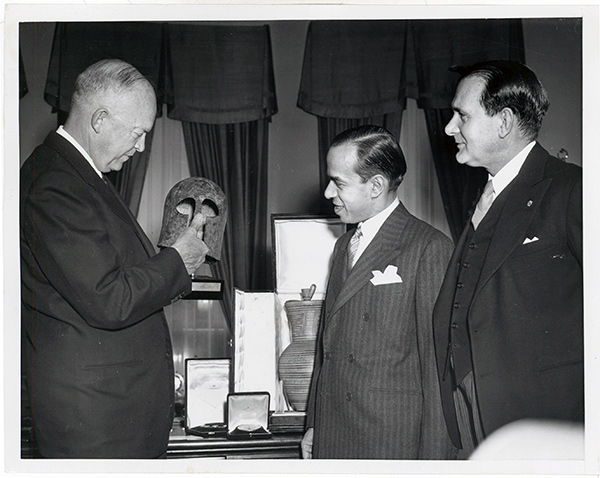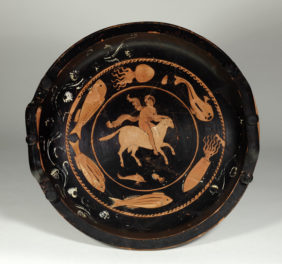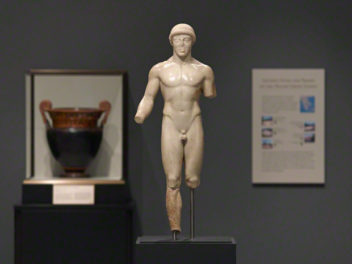
President Dwight D. Eisenhower (left) receives ancient artifacts from Minister Spyros Markezinis (center). Photo courtesy of the Eisenhower Presidential Library, Abilene, Kansas.
When is a gift not simply a gift? Scholars would argue: always. Across human history, the giving of gifts has been used by diverse cultures to establish agreements and obligations of reciprocity between groups. Just as gift exchange can be a complicated dance between family or friends, gifts play a complex role within the sphere of state diplomacy. State officials intend objects selected for diplomatic exchange to convey weighty expectations and hopes, such as garnering support for a nation’s security or establishing a trade agreement.
In the late 1940s, Greek politicians began to give antiquities to American presidents and other officials. Nassos Papalexandrou stumbled upon this modern, under-studied tradition shortly after joining the University of Texas at Austin’s art history faculty, and he began researching the character of the antiquities and why they were chosen as diplomatic gifts. We are fortunate to have him join us at the Getty Villa on February 27, 2016, to present his unfolding research in a public lecture, Our Presidents’ Gifts: The Role of Greek Antiquities in Greek-U.S. Political Relationships after World War II. In anticipation, he offered the following preview of his findings to Getty antiquities curator Kenneth Lapatin.
Kenneth Lapatin: How did this research project come about?
Nassos Papalexandrou: When I first started teaching at the University of Texas at Austin, my senior colleague, Jack Kroll, alerted me to the presence of an Attic amphora of the Geometric period (about 900–700 B.C.) at the Sam Rayburn Library and Museum in Bonham, TX. I grew very curious about this: what was an early Greek amphora doing in a small town in Texas? I found out that, in 1949, a delegation from the Greek parliament had presented the amphora to then-Speaker of the House Sam Rayburn (D-TX) for his support of the Marshall Plan, which helped Greece recover from World War II.
Since then, Greek antiquities or modern artifacts inspired by antiquity have regularly been presented as diplomatic gifts to U.S. presidents or high-ranking officials. President Lyndon B. Johnson received a large number of antiquities from Greek heads of state, as well as from dignitaries of Italy, Israel, and Turkey (and, fortunately for my research, my office in Austin is 50 yards from the LBJ Presidential Library and Museum). Antiquities may be silent, yet they are very eloquent tools when it comes to diplomacy. My research project pivots around this idea.
About how many artifacts have you discovered that were presented as diplomatic gifts, and do they share a common theme?
The corpus is large, if one takes into account artifacts that range chronologically from antiquity to recent Greek history. Pottery, especially fine wares of very good quality, predominates among these ancient artifacts. Since 1992, all objects received as gifts by US officials are published in the Federal Register, which details the circumstances of presentation, the value of the gift, and why it was accepted. (Search for “Gifts to Federal Employees from Foreign Government Sources.”)

A sampling of diplomatic gifts to U.S. presidents, from a Chinese watercolor to an Indian carpet, with reasons for acceptance. Source: federalregister.gov
Can you tell us a little bit about the significance of the objects as ancient artifacts, and how they are in line with, or diverge from, their function as political gifts?
The ancient artifacts represent a very wide range of ancient material culture. A few may have been used as dedicatory objects—offered to the gods in ancient sanctuaries—but none belong to the category of political gifts as understood today. I find it particularly fascinating that the artifacts were carefully chosen to express ideological messages. On certain occasions, they were even modified to fit the occasion. For example, in my talk I will show an architectural block from the Athena Nike Temple on the Acropolis that was inscribed with a modern decree conferring the honorary title of “proxenos” (a type of honorary consul) on President Harry S. Truman. This gesture was, let’s say, extravagant, especially if one takes into account that since the beginnings of the modern Greek state the Greeks have viewed the Acropolis as sacred ground.
Share your favorite story of one such gift that’s particularly memorable or surprising.
The Greeks showered Presidents Truman and Dwight D. Eisenhower with beautiful objects, but President John F. Kennedy received heavy transport amphorae (large ceramic storage vessels for transporting goods) from the Roman and medieval periods (now in Kennedy’s Presidential Library and Museum in Boston). In strict archaeological terms these are very interesting but, let’s face it, they are unappealing in appearance. My suspicion is that the presenter, former prime minister of Greece Kostas Karamanlis, who came to discuss business and trade relations with President Kennedy, used these artifacts to punctuate the tenor of his political mission.
You mentioned that you first encountered these presidential gifts at the Rayburn Library and Museum. Where are most of these gifts located?
Most of these artifacts are in presidential libraries and museums administered by the National Archives and Records Administration. I cannot emphasize enough the importance of these institutions, as they rank among the most valuable cultural treasures in the United States today. Their holdings chronicle this country’s history and culture in visual and material terms, and as such are certainly worthy of attention.
Other than the antiquities you research, do you know of other examples of surprising or dramatic diplomatic gifts across history?
I can’t help but think of the famous Horse of Troy.… In some sense it was a diplomatic gift, a physical token of conciliation and peace. Fortunately, the artifacts received by U.S. presidents were of a different nature, though conveyed messages that are worth our attention and study no less that the ambivalent Trojan Horse.
_______
The lecture Our Presidents’ Gifts: The Role of Greek Antiquities in Greek-U.S. Political Relationships after World War II takes place at the Getty Villa on February 27, 2016. Admission is free; get a ticket here.




Comments on this post are now closed.